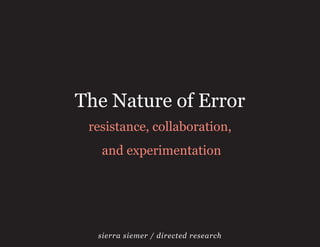Directed Research Presentation 5
- 1. The Nature of Error resistance, collaboration, and experimentation sierra siemer / directed research
- 2. Any man can make mistakes, but only an idiot persists in his error marcus tullius cicero sierra siemer / directed research
- 3. What can we learn from exploring error? how can we transcend the limits of our human rationale? sierra siemer / directed research
- 4. This thesis presents the hypothesis that mechanical errors are forms of technological collaboration and resistance that provide an opportunity for communication and discovery. Rather than disregarding these interventions, the unintended ends should be explored and embraced. Since errors are found accidentally, experimentation should be conducted, both to explore this opportunity for communication, and because errors often provide great sources of inspiration and illumination outside of the limits of human rationale. sierra siemer / directed research
- 5. Human Error /inherehent to human nature /unintended ends & accidental discoveries /why we make mistakes /error as personal style sierra siemer / directed research
- 6. Mechanical Error /collaboration and resistance /opportunities for communication /results outside of human rationale /mechanical agency and voice sierra siemer / directed research
- 7. Experimentation /key to finding error /co-opting rules /process sierra siemer / directed research
- 8. Reappropriation /turning errors into successes /experimental film, art, music sierra siemer / directed research
- 9. Learning /interpret errors /new avenues of exploration /new discoveries sierra siemer / directed research
- 10. Thank you. sierra siemer / directed research










